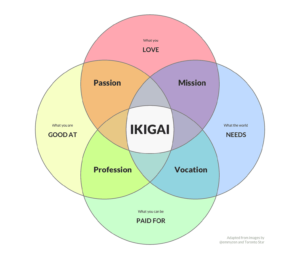 When I was in high school, guidance counselors administered aptitude tests to help me figure out what I was good at. A wise teacher took me aside and warned that I would likely be good at any number of things, and suggested it was more important that I think about what I loved. That was excellent advice, but still incomplete. Now I understand that I needed to consider at least two other factors to find my “raison d’etre,” or “reason to be.”
When I was in high school, guidance counselors administered aptitude tests to help me figure out what I was good at. A wise teacher took me aside and warned that I would likely be good at any number of things, and suggested it was more important that I think about what I loved. That was excellent advice, but still incomplete. Now I understand that I needed to consider at least two other factors to find my “raison d’etre,” or “reason to be.”
Ikigai (生き甲斐, pronounced ee-kee-guy) is a Japanese concept that means “a reason for being.” The word combines two Japanese words: iki (生き) meaning “life; alive” and kai (甲斐) meaning “(an) effect; result; fruit; worth; use; benefit.”
Ikigai refers to having a direction or purpose in life, that which makes one’s life worthwhile, and towards which an individual takes spontaneous and willing actions giving them satisfaction and a sense of meaning to life. In principle, it is where one’s personal passions, beliefs, values and vocation come together.
Our “reason for being” is the convergence of our passions, professions, vocations and missions.
 PASSION: What you love and are good at. This can provide satisfaction, but might feel useless.
PASSION: What you love and are good at. This can provide satisfaction, but might feel useless.
PROFESSION: What you are good at and for which someone will pay you. This might provide comfort but a feeling of emptiness.
VOCATION: What you can be paid for that the world needs. This may provide both excitement and complacency, but perhaps to a sense of uncertainty, as well.
MISSION: What the world needs and you love. This may provide delight and fulfillment, but no wealth.
To live a happy and fulfilled life, then, we need all four. That is ikigai!